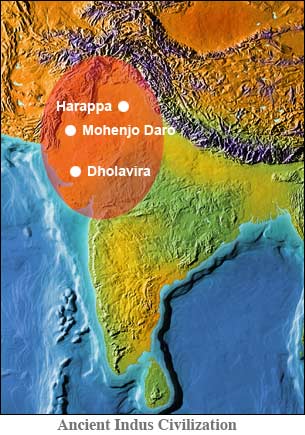As early as 2,500 BCE, the area around the Indus river was home to a thriving civilization with large urban centers, farming communities, thriving trade, and sophisticated agricultural methods. Major cities of the Indus river valley include Harappa and Mohenjo-daro. Archeological findings in these cities may be interpreted to show some connections to religious practices characteristic of Hinduism. Places that were possibly used for ritual baths, numerous statues of deities, and images of individuals sitting in meditation seem to be very similar to practices in later Hinduism.
Unfortunately, we cannot say with certainty what the people of the Indus Valley civilization believed. The archaeological discovery of the ancient cities occurred less than 100 years ago, and the language of these peoples has not been deciphered. Therefore, it is not yet possible to know who they were and what they believed.
The great cities of Harappa and Mohenjo-daro along with most other cities of the Indus River declined in the first part of the second millennium. At one time, it was believed that this civilization was destroyed by waves of invaders. There were many problems with this theory, however. More recently, evidence has been discovered that suggests that the cities of the Indus River valley declined due to climate change: rivers shifted or dried up entirely as the monsoons dramatically decreased. Today, this seems to be the most logical and likely explanation of why these once great cities were abandoned.
